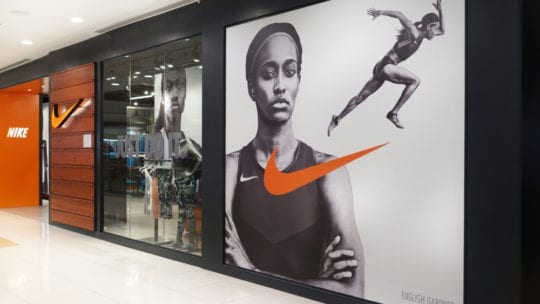
This past Mother's Day, The New York Times ran an opinion piece featuring several female athletes who are sponsored by Nike, focusing on the fact that Nike did not provide these athletes with paid maternity leave.
"When Alysia Montaño ran in the 2014 United States Championships while eight months pregnant," the piece reads, "she was celebrated as 'the pregnant runner. Privately, she had to fight with her sponsor to keep her paycheck."
The piece highlights a strong disconnect between Nike's progressive ad campaigns and its practices, citing commercials like one released in February that was celebrated for showcasing "women at all stages of their careers, from childhood to motherhood" and a Mother's Day commercial released this year that promotes gender equality.
When it comes to actually supporting female athletes around childbirth, though, Nike has not been nearly as forward-thinking. Olympian Kara Goucher told The Times how a lack of maternity leave required that she resume training one week after childbirth in 2010. "It wasn’t even when her doctor told her she must choose: run 120 miles each week or breast-feed her son," the piece read. "Her body couldn’t do both."
Goucher then learned that Nike would stop paying her until she resumed racing. Because she was already pregnant, she needed to schedule a half-marathon three months after giving birth to her son. When her son got seriously ill, she was forced to choose again: stay with her sick infant or prepare for a race that would restart her income. She had no choice but to keep training,
“I felt like I had to leave him in the hospital, just to get out there and run, instead of being with him like a normal mom would,” Goucher told the Times in tears. “I’ll never forgive myself for that.”
The piece did concede that there are times when a pregnant athlete is compensated—like Serena Williams—although in those rare cases, the athlete's team must aggressively lobby for pay. Nonetheless, it makes clear that there are several lessons for in-house PR teams around making sure your messaging and practices are consistent.
Brand communicators should close the gap between what's promoted and what's practiced
"Nike acknowledged in a statement that some of its sponsored athletes have had their sponsorship payments reduced because of pregnancies," the op-ed continues. "But the company says it changed its approach in 2018 so that athletes are no longer penalized. Nike declined to say if it wrote those changes into its contracts."
"According to a 2019 Nike track and field contract shared with the Times, Nike can still reduce an athlete’s pay 'for any reason' if the athlete doesn’t meet a specific performance threshold, for example a top five world ranking. There are no exceptions for childbirth, pregnancy or maternity."
The details of such contracts are not something that Nike's PR team necessarily had a hand in, but the legal team certainly did. To this end, it's a communicator's job to work across departments and make sure that its internal practices are consistent with its external messaging—especially when that messaging has the vast reach of Nike's ad spots.
As it stands now, this disconnect makes Nike look opportunistic for appropriating trending social issues like gender equality without putting that support into practice within its own corporate culture.
PR and Legal need to work better together
Communicators know that just because a document is private—like a contract—doesn't mean that it won't eventually leak out to the public. If a contract contains language or stipulations that might be perceived as controversial, they present a clear opportunity for PR to partner with the brand's legal team and come up with better language.
In the case of the aforementioned 2019 Nike track and field contract, though, it's not about what the language says so much as what it doesn't say. The contract's authority to terminate a sponsorship "for any reason" doesn't include pregnancy, disability or other specific human circumstances. When your brand purports to be looking out for the mothers it employs, that's a clear blind spot that could have easily been caught had a communicator given it a clear audit.
Moreover, PR can also provide an opportunity to provide legal with guidance as to what it should be doing, not just what it can, in the language of a contract.
"Many American laws protect the rights of pregnant employees—they can’t be fired, for instance," the Times piece says. "But, since professional athletes are more like independent contractors, those protections don’t apply."
How in-line with its ad campaigns would it be if Nike, acknowledging that sponsored athletes are not protected the same way as salaried employees, decided to compensate them with paid maternity leave anyway? More than a gesture, that would actually show the brand putting its money where its mouth is.
